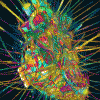Things that boost GABA, function like theanine or magnolia. Things that boost acetylcholine function, like bacopa or eggs. Perhaps some dopamine and glutamate antagonists. Things that keep cortisol in check.
Exercise, good diet, abstinence. If you're only smoking at night, as opposed to all throughout the day, it should be easier to give up and find ways to occupy yourself in the remaining time.
Maybe less caffeine, more ginger (COX-2 inhibitor)?
Combined effects of THC and caffeine on working memory in rats.
Panlilio LV1, Ferré S, Yasar S, Thorndike EB, Schindler CW, Goldberg SR. 2012.
BACKGROUND AND PURPOSE:
Cannabis and caffeine are two of the most widely used psychoactive substances. Δ(9) -Tetrahydrocannabinol (THC), the main psychoactive constituent of cannabis, induces deficits in short-term memory. Caffeine, a non-selective adenosine receptor antagonist, attenuates some memory deficits, but there have been few studies addressing the effects of caffeine and THC in combination. Here, we evaluate the effects of these drugs using a rodent model of working memory.
EXPERIMENTAL APPROACH:
Rats were given THC (0, 1 and 3 mg·kg(-1) , i.p.) along with caffeine (0, 1, 3 and 10 mg·kg(-1) , i.p.), the selective adenosine A(1) -receptor antagonist CPT (0, 3 and 10 mg·kg(-1) ) or the selective adenosine A(2A) -receptor antagonist SCH58261 (0 and 5 mg·kg(-1) ) and were tested with a delayed non-matching-to-position procedure in which behaviour during the delay was automatically recorded as a model of memory rehearsal.
KEY RESULTS:
THC alone produced memory deficits at 3 mg·kg(-1) . The initial exposure to caffeine (10 mg·kg(-1) ) disrupted the established pattern of rehearsal-like behaviour, but tolerance developed rapidly to this effect. CPT and SCH58261 alone had no significant effects on rehearsal or memory. When a subthreshold dose of THC (1 mg·kg(-1) ) was combined with caffeine (10 mg·kg(-1) ) or CPT (10 mg·kg(-1) ), memory performance was significantly impaired, even though performance of the rehearsal-like pattern was not significantly altered.
CONCLUSION AND IMPLICATIONS:
Caffeine did not counteract memory deficits induced by THC but actually exacerbated them. These results are consistent with recent findings that adenosine A(1) receptors modulate cannabinoid signalling in the hippocampus.
Δ9-THC-caused synaptic and memory impairments are mediated through COX-2 signaling.
Chen R1, Zhang J, Fan N, Teng ZQ, Wu Y, Yang H, Tang YP, Sun H, Song Y, Chen C. 2013.
Marijuana has been used for thousands of years as a treatment for medical conditions. However, untoward side effects limit its medical value. Here, we show that synaptic and cognitive impairments following repeated exposure to Δ(9)-tetrahydrocannabinol (Δ(9)-THC) are associated with the induction of cyclooxygenase-2 (COX-2), an inducible enzyme that converts arachidonic acid to prostanoids in the brain. COX-2 induction by Δ(9)-THC is mediated via CB1 receptor-coupled G protein βγ subunits. Pharmacological or genetic inhibition of COX-2 blocks downregulation and internalization of glutamate receptor subunits and alterations of the dendritic spine density of hippocampal neurons induced by repeated Δ(9)-THC exposures. Ablation of COX-2 also eliminates Δ(9)-THC-impaired hippocampal long-term synaptic plasticity, working, and fear memories. Importantly, the beneficial effects of decreasing β-amyloid plaques and neurodegeneration by Δ(9)-THC in Alzheimer's disease animals are retained in the presence of COX-2 inhibition. These results suggest that the applicability of medical marijuana would be broadened by concurrent inhibition of COX-2.
wiki:
Nonsteroidal anti-inflammatory drugs such as ibuprofen work by inhibiting the COX enzymes, which convert arachidonic acid to prostaglandin H2 (PGH2). PGH2, in turn, is converted by other enzymes to several other prostaglandins (which are mediators of pain, inflammation, and fever) and to thromboxane A2 (which stimulates platelet aggregation, leading to the formation of blood clots).
The exact mechanism of action of ibuprofen is unknown. Ibuprofen is a nonselective inhibitor of cyclooxygenase, an enzyme involved in prostaglandin synthesis via the arachidonic acid pathway. Its pharmacological effects are believed to be due to inhibition of cyclooxygenase-2 (COX-2) which decreases the synthesis of prostaglandins involved in mediating inflammation, pain, fever, and swelling. Antipyretic effects may be due to action on the hypothalamus, resulting in an increased peripheral blood flow, vasodilation, and subsequent heat dissipation. Inhibition of COX-1 is thought to cause some of the side effects of ibuprofen including gastrointestinal ulceration. Ibuprofen is administered as a racemic mixture. The R-enantiomer undergoes extensive interconversion to the S-enantiomer in vivo. The S-enantiomer is believed to be the more pharmacologically active enantiomer.[39]
Like aspirin and indometacin, ibuprofen is a nonselective COX inhibitor, in that it inhibits two isoforms of cyclooxygenase, COX-1 and COX-2.
================
================
---> https://en.wikipedia...inoid_receptors
Cannabinoids activate mesoprefrontocortical dopaminergic neurons, an activation that releases dopamine primarily in the prefrontal cortex.[17] In fact, stimulation of the prefrontal cortex dopamine receptor D1 is associated with working memory impairments.[3]
D2 dopamine receptors enable Δ9-tetrahydrocannabinol induced memory impairment and reduction of hippocampal extracellular acetylcholine concentration
Chronic ?9-Tetrahydrocannabinol Exposure Induces a Sensitization of Dopamine D2/3 Receptors in the Mesoaccumbens and Nigrostriatal Systems
The development of supersensitive midbrain DA autoreceptors :( following chronic THC is thus expected to result in increased self-inhibition and hypoactivity of DA neurons. This hypothesis concurs with the substantial decrement in spontaneous electrical activity of NAcc-projecting DA neurons observed in VTA following repeated THC (Diana et al, 1998) and with the abrupt reductions in mesolimbic DA neuronal activity and accumbal DA levels following SR 141716A-precipitated THC withdrawal
Chronic activation of the D2 dopamine autoreceptor inhibits synaptogenesis in mesencephalic dopaminergic neurons in vitro.
Our results suggest that chronic activation of the D2 autoreceptor inhibits synaptogenesis :( by mesencephalic dopamine neurons through translational regulation of the synthesis of proteins required for synapse formation
![]()






















































